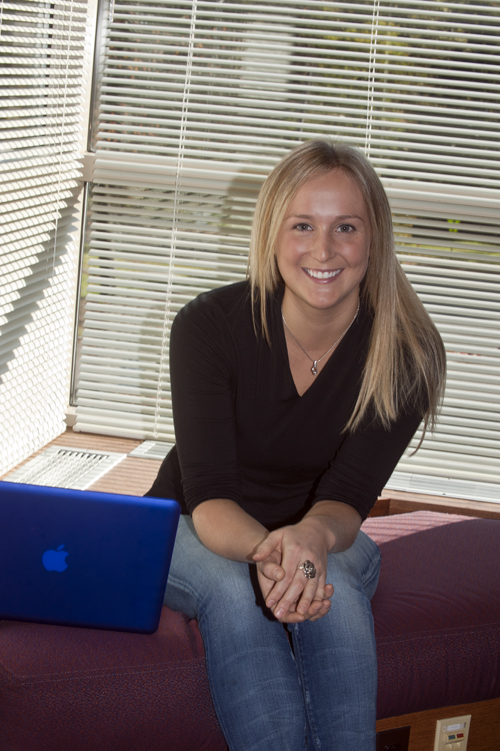
By
Boston College law student Anusia Hirsch admits that she was never much of a writer. Nor had she ever spoken in front of a camera or had any extensive dealings with social media. So the Marblehead, Mass., native seemed an unlikely candidate to make an impact in the legal community by becoming the first law student to blog about actual cases and current clients.
Hirsch worked with BC Legal Assistance Bureau Director Alexis Anderson, BC Law Director of Marketing and Communications Nate Kenyon and other administrators to put her first-hand experience on the web. Her groundbreaking blog chronicles her work at LAB, specifically a case where she helped to secure Social Security benefits for a disabled client with the pseudonym “Sarah.” Entries were edited and approved by “Sarah,” lawyers working directly with Hirsch, and the BC administration.
Hirsch’s work became the subject of debate in the larger legal community, including BC Law alumnus Robert Ambrogi’s blog and the American Bar Association Journal.
The blog Simple Justice warned that Hirsch’s blogging “shifted the responsibility from lawyers/law student to client to determine whether privilege should be waived. Technically, it should suffice, as the privilege belongs to the client, and the client is entitled to waive privilege. Technically...Even if this is handled with the utmost discretion and circumspection at BCLAB, will the next law student who decides to reveal all be similarly cautious, or will this become the new, cool trend for law students to reveal client confidences?”
Hirsch acknowledges the entries test the limits of attorney-client privilege and raise legal ethical questions, all of which she seeks to address.
“We’re testing new waters, which, in the legal profession, can be risky business, but we all agreed that it was a project worth taking on,” said Hirsch, a graduate of Tabor Academy and Tulane University. “First and foremost, it was imperative to protect client confidentiality. We were particularly sensitive to the perception that we were infringing in any way on the attorney-client relationship. We didn’t want to offend people.”
Hirsch said she was willing to take on the challenge because she realized the need for a space where first-year students – and even seasoned attorneys – could turn to see the challenges and triumphs of a student becoming a lawyer.
“Throughout my first year, I had wished that I could get a look at others’ experiences so I knew better what to expect,” said Hirsch. “I wanted to give that – a formative experience - to other law students.
“One of the things lawyers say all the time is ‘don’t reinvent the wheel.’ We don’t do it in case law, or briefs or documentation, so I don’t know why, with clients, we do it all the time,” said Hirsch. “I really believe that we can teach one another a great deal through shared experiences.”
Hirsch said she considered and understood “what a beast” the Internet could be, but in writing and recording videos, she was always more concerned about the professional ramifications, rather than the personal ones.
“My father likes to say that he was born without the embarrassment gene. I think I may have inherited that from him. We’re cut from the same cloth,” said Hirsch.
Hirsch said she is still considering what area of law she will pursue. She secured a summer associate position at Reimer & Braunstein and is eager to participate in the rotation program at that firm.
Hirsch also hopes to continue engaging in social media and inspire others to share their law school experiences.
“My hope is that people continue to open their minds to connect and learn in different ways, not to shut things out simply because it hasn’t been done before,” said Hirsch. “It is possible to embrace this form of technology and do it in a way that is respectful to everyone involved.”



